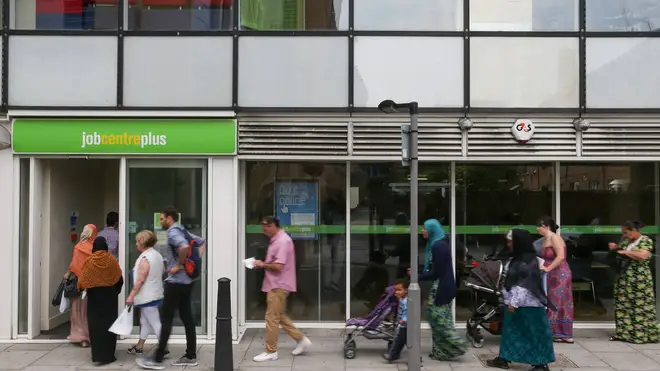
Ian Payne 4am - 7am
15 September 2020, 07:29 | Updated: 15 September 2020, 09:41

The Office for National Statistics says the number of UK workers on payrolls fell by 695,000 between March and August due to the impact of the coronavirus pandemic.
The Office for National Statistics (ONS) said the rate of unemployment increased as another 36,000 jobs fell off payrolls across the country.
Meanwhile, unemployment increased by 104,000 to 1.4 million for the three months to July.
It said the rate of unemployment therefore increased to 4.1%, in line with analyst expectations.
ONS director of economic statistics Darren Morgan said: "Some effects of the pandemic on the labour market were beginning to unwind in July as parts of the economy reopened.
"Fewer workers were away on furlough and average hours rose.
"The number of job vacancies continued to recover into August, too.
"Nonetheless, with the number of employees on the payroll down again in August and both unemployment and redundancies sharply up in July, it is clear that coronavirus is still having a big impact on the world of work."
Companies have continued to announce redundancy programmes through the pandemic, with London City Airport the latest to reveal cuts as it announced 239 jobs losses on Monday.
The ONS said the increase in unemployment has particularly impacted young people, as it revealed a 76,000 rise in the number of unemployed people aged between 16 and 24 over the past year.
Meanwhile, the number of people in employment dropped to 32.98 million, falling 12,000 since the previous quarter.
However, the rate of employment nudged 0.1 percentage points higher to 76.5%.
This was bolstered by a joint record high for the number of women in work across the UK, with 72.9% of women in work.
Meanwhile, jobs vacancies for the three months to August rebounded.
The ONS said there were an estimated 434,000 vacancies in the quarter, rising 30% from a record low in the quarter to June, but still significantly below pre-virus levels.
ONS director of economic statistics Darren Morgan said: "Some effects of the pandemic on the labour market were beginning to unwind in July as parts of the economy reopened.
"Fewer workers were away on furlough and average hours rose.
"The number of job vacancies continued to recover into August, too.
"Nonetheless, with the number of employees on the payroll down again in August and both unemployment and redundancies sharply up in July, it is clear that coronavirus is still having a big impact on the world of work."
The ONS also reported that average wages were 1% lower than a year ago, with particular slumps in wages in the construction, retail and hospitality sectors.
Nye Cominetti, senior economist at the Resolution Foundation, said: "The reopening of the economy this summer after lockdown may have boosted economic activity, but it has not spurred a recovery in the jobs market, with unemployment and redundancies rising sharply in July.
"Coming before the Job Retention Scheme that is still supporting millions of workers began its phase-out, this points to an extremely challenging autumn for employment.
"All the evidence is point to a mounting jobs crisis across Britain."
Minister for employment Mims Davies said: "We recognise that the pandemic has been difficult for many people who are worried about their incomes and that's why our £30 billion plan for jobs is aimed at protecting, supporting and creating jobs and it's welcome news that there is some recovery in vacancies."
Shadow work and pensions secretary Jonathan Reynolds said: "These new figures are deeply concerning, over five million people are not working and 2.5 million have been out of work for three months or more.
"Unemployment will continue to rise unless the Government acts now and adopts a more flexible approach targeted at the sectors that need it most."